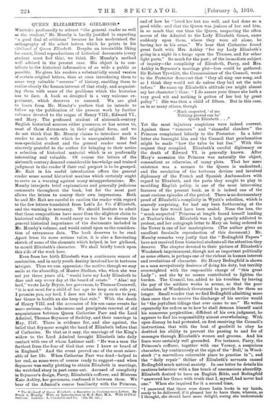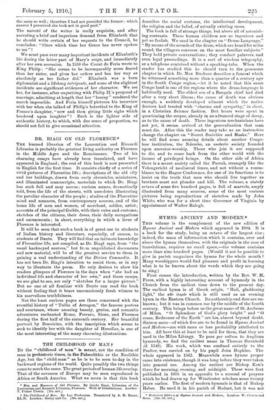QUEEN ELIZABETH'S GIRLHOOD.*
WRITING professedly to attract "the general reader as well as the student," Mr. Mumby is hardly justified in expecting "a good deal of criticism" because he has modernised the orthography of the select letters which he prints in his tifirlhood of Queen Elizabeth. Despite an irresistible liking for exact, literal reproductions of historical documents (every student must feel this), we think Mr. Mumby's method well advised in the present case. His object is to con- tribute to the historical information of as wide a public as poasible. He gives his readers a substantially sound version of certain original letters, thus at once introducing them to some very valuable " sources " of history, enabling them to realise clearly the human interest of that study, and acquaint- ing them with some of the problems which the historian has to face. A book so designed is a very welcome ex- periment, which deserves to succeed. We are glad to learn from Mr. Mumby's preface that he intends to follow up the publication of the present work by further volumes devoted to the reigns of Henry VIII., Edward VI., and Mary. The professed student of sixteenth-century English historical sources either possesses, or has access to, most of these documents in their original form, and we do not think that Mr. Mumby claims to introduce such a reader to much with which he is unacquainted. But the non-specialist student and the general reader must feel sincerely grateful to the author for bringing to their notice a selection of historical material which is so profoundly interesting and valuable. Of course the letters of the sixteenth century demand considerable knowledge and trained judgment in the reader if their real purport is to be grasped. Mr. Rait in his useful introduction offers the general reader some sound historical maxims which certainly ought to serve as a warning against many misapprehensions. Mr. Mumby interjects brief explanations and generally judicious comments throughout the book, but for the most part allows the letters to convey their own impressions. Both he and Mr. Rait are careful to caution the reader with regard to the few letters translated from Leti's La Vie d'.Elizabeth, and the warning is necessary. We should hesitate to admit that these compositions have more than the slightest claim to historical validity. It would carry us too far to discuss the general historical importance of the documents included in Mr. Mumby's volume, and would entail upon us the considera- tion of extraneous data. The book deserves to be read. Apart from its more serious value, it is also a fascinating sketch of some of the elements which helped, in her girlhood, to mould Elizabeth's character. We shall briefly touch upon this s:de of the work here.
Even from her birth Elizabeth was a continuous source of contention, and in early youth destiny involved her in tortuous intrigue. Thus we can appreciate the motive, though we may smile at the absurdity, of Master Shelton, who, when she was not yet three years old, "would have my Lady Elizabeth to dine and sup every day at the board of estate." " Alas ! my lord," wrote Lady Bryan, her governess, to Thomas Cromwell, "it is not meet for a child of her age to keep such rule yet. I promise you, my lord, I dare not take it upon me to keep her Grace in health an she keep that rule." With the death of Henry VIII. and the accession of his son came events far more serious,—the indecorous and precipitate renewal of old acquaintance between Queen Catherine Parr and the Lord Admiral, Thomas Seymour of Sudeley, and their marriage in May, 1547. There is evidence for, and also against, the belief that Seymour sought the hand of Elizabeth before that of Catherine. Be that as it may, the marriage of the King's widow to the Lord Admiral brought Elizabeth into daily contact with one of whom Latimer said: "He was a man the farthest from the fear of God that ever I knew or heard of in England." And the event proved one of the most miser- able of her life. When Catherine Parr was dead—helped to her end, as some were of course ready to suggest—and when Seymour was really plotting to obtain Elizabeth in marriage, the wretched story in part came out. Accused of complicity in Seymour's design, Parry, Elizabeth's cofferer, and Mistress Kate Ashley, her governess, confessed it between them. We hear of the Admiral's coarse familiarity with the Princess,
• The Girlhood of Queen Elizabeth: a Narrative in Contemporary Letters. By Frank A. Mumby. With an Introduction by R. S. Rait, MA. With 10 Illtts- trations. London: A. Constable and Co. flOs. 6d. net.]
and of how he "loved her but too well, and had done so a good while : and that the Queen was jealous of her and him, in so much that one time the Queen. suspecting the often access of the Admiral to the Lady Elizabeth Grace, came suddenly upon them, where they were all alone, he having her in his arms." We hear that Catherine found great fault with Mrs. Ashley "for my Lady Elizabeth's going in a night in a barge upon the Thames, and for other light parts." So much for the past ; of the immediate subject of inquiry—the complicity of Elizabeth, Parry, and Mrs.
Ashley in Seymour's marriage plot—less could be gathered.
Sir Robert Tyrwhitt, the Commissioner of the Council, wrote to the Protector Somerset that "they all sing one song, and so I think they would not do unless they had set the note before." He sums up Elizabeth's attitude (we might almost say her character !) thus : "I do assure your Grace she bath a very good wit and nothing is gotten of her but by great policy " ! She was then a child of fifteen. But in this case, as in so many others, though "Much suspected, of me Nothing proved can be' Quoth Elizabeth . . ."
Yet the most injurious suspicions were indeed current. Against these " rumours " and "shameful slanders" the Princess complained bitterly to the Protector. In a later letter she besought him and the Council that proclamation might be made "how the tales be but lies." With this request they complied. Elizabeth's careful diplomacy on the death of Edward VI. is generally known. After Mary's accession the Princess was naturally the object, consentient or otherwise, of many plots. That her mere existence was a menace to the Queen is undoubted; and the revelation of the tortuous devices and involved diplomacy of the French and Spanish Ambassadors with regard to Elizabeth, and the parts they sought to play in moulding English policy, is one of the most interesting features of the present book, as it is indeed one of the most curious episodes of the period. There is no documentary proof of Elizabeth's complicity in Wyatt's rebellion, which is scarcely surprising, for had any been forthcoming at the time her fate would have been sealed. None the less, the " much suspected" Princess at length found herself landing at Traitor's Gate. Elizabeth was a lady greatly addicted to protest, and her autograph letter to Mary on being ordered to the Tower is one of her masterpieces. (The author gives an excellent facsimile reproduction of this document.) Mr.
Mumby remarks very justly that the "Bedingfeld Papers" have not received from historical students all the attention they deserve. The chapter devoted to their picture of Elizabeth's Woodstock imprisonment, though not as important politically as some others, is perhaps one of the richest in human interest and revelations of character. Sir Henry Bedingfeld is shown as a man scrupulously desirous of doing his duty, but terribly overweighted with the responsible charge of "this great Lady " ; and she ley no means contributed to lighten the burden. The Council, too, added to his troubles by leaving the pay of the soldiers weeks in arrear, so that the poor victuallers of Woodstock threatened to provide for them no longer. Small wonder that we find Bedingfeld admitting more than once that to receive the discharge of his service would be "the joyfullest tidings that ever came to me." He writes repeatedly for orders as to how he shall demean himself amid his numerous perplexities ; diffident of his own judgment, he appears to find his responsibility almost overwhelming. With open dismay he had protested, on first receiving the Council's instructions, that with the best of goodwill to obey he doubted his ability to prevent the passing to and fro of messages through Elizabeth's women and grooms. And his fears were certainly well grounded. For instance, Parry, the Princess's cofferer, together with one Verney, a suspicious character, lay continuously at the sign of the 'Bull,' in Wood- stock (" a marvellous colourable place to practise in "), and the "daily repair" thither of Elizabeth's servants caused Bedingfeld much natural anxiety. In one letter he details his cautious behaviour with a fine touch of unconscious absurdity. Elizabeth desired to have an English Bible, and Bedingfeld "answered her Grace with truth that I, myself, had never had one." When she inquired for it a second time,
"I answered that there were divers Latin books in my bands, ready to be delivered, if it pleased her to have them, wherein, as I thought, she should have more delight, seeing she understands the same so well therefore I had not provided the former : which answer I perceived she took not in good part."
The naivete of the writer is really exquisite, and after narrating a brief and imperious demand from Elizabeth that he should write certain of her requests to the Council, he concludes : "Since which time her Grace has never spoken to me " !
We must pass over many important incidents of Elizabeth's life durirg the latter part of Mary's reign, and immediately after her own accession. In 1558 the Count de Feria wrote to King Philip : "She seems to be incomparably more feared than her sister, and gives her orders and has her -way as absolutely as her father did." Elizabeth was a born diplomatist and a lifelong intrigante, and some of the slightest incidents are significant evidences of her character. We see her, for instance, after coquetting with Philip IL's proposal of marriage, admitting at length that her "heresy" rendered the match impossible. And Feria himself pictures his interview with her when she talked of Philip's betrothal to the King of France's daughter, "now and then giving little sighs which bordered upon laughter" ! Such is the lighter side of authentic history, to which, with due sense of proportion, we should not fail to give occasional attention.











































 Previous page
Previous page